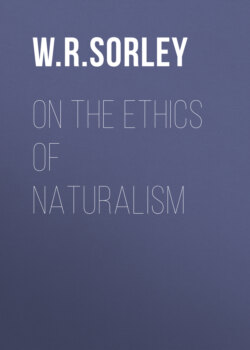Читать книгу On the Ethics of Naturalism - W. R. Sorley - Страница 6
На сайте Литреса книга снята с продажи.
Оглавление(b) difference in kind of pleasurable objects;
Further—and this is the second objection—the above analysis may be considered by some not to have taken sufficient account of the difference in the objects in which a human being can take pleasure, and of the fact that the moral quality of men differs, not according as they act for pleasure or not, but according to the kind of actions and sufferances in which they find pleasure. There can be no doubt of the importance of this distinction for questions of practical morals. The man in whom "selfishness takes the shape of benevolence," as it did in Bentham, is infinitely better than the man in whom it retains the form of selfishness. But the consideration is important just because it goes on the implied assumption that the hedonistic is not the chief aspect of conduct, and that there is a difference between courses of action more fundamental than the pleasurable or painful feeling attendant on them. |but this involves a reference to something else than pleasure,| If the principles on which the objection is founded were consistently adhered to and followed out, they would make not pleasure, but something else—that, namely, by which pleasures differ from one another in kind—the ethical standard. But if, in ultimate analysis, it is the pleasure felt or expected that moves to action, it would seem that there is no way in which the conclusion of the preceding argument can be avoided. If pleasure is the motive, it must be quâ pleasure—that is to say, either the greatest apparent pleasure, or the greatest present pleasure, is the motive. If difference of quality be admitted, we are introducing a determining factor other than pleasure. Certain kinds of pleasure may be better than others for the race or for the state. |which psychological hedonism does not admit of.| But these differences must be reducible to terms of individual pleasure admitting of purely quantitative comparisons, before they become motives to action.[30] From the point of view of the whole, we may say that one action leads to a greater sum of pleasure than another. But, in judging the action of individuals, all that we can say of it is, that to one man one class of actions gives pleasure, to another another: each man is equally following the course of action which either (a) will bring, or (b) seems to him likely to bring, the greatest pleasure, or (c) is actually most pleasant at the time. From the nature of the individual we can evolve no end beyond egoistic hedonism. And even this end can only be made his at each occurrence of action (assuming the first alternative (a) to be incorrect) by enlightening his intellect so that (b) will correspond with the actual greatest pleasure, or by also enlivening his imagination of future pleasures and pains so that (c) will correspond with it; and this, as has been shown, could only be effected under conditions which are inconsistent with the principles of human action.
